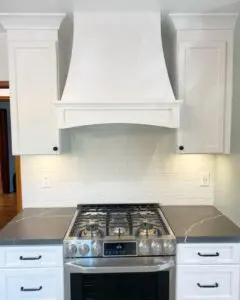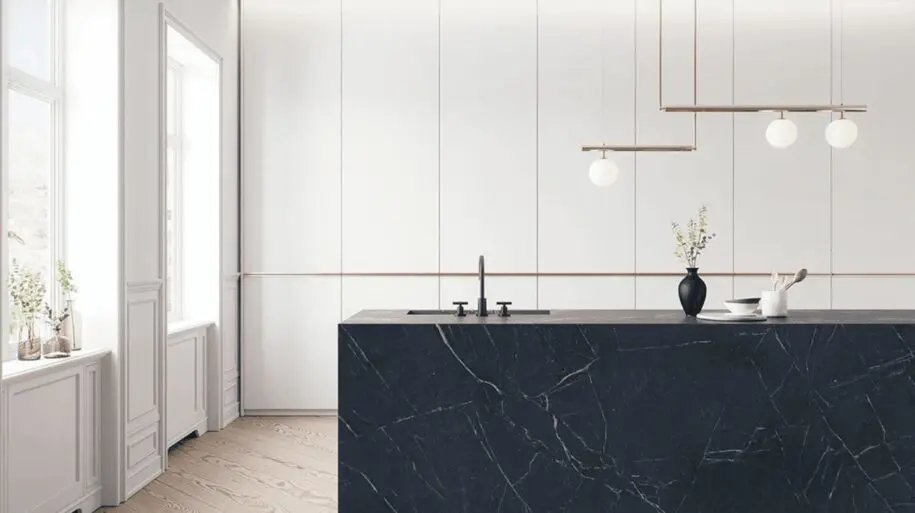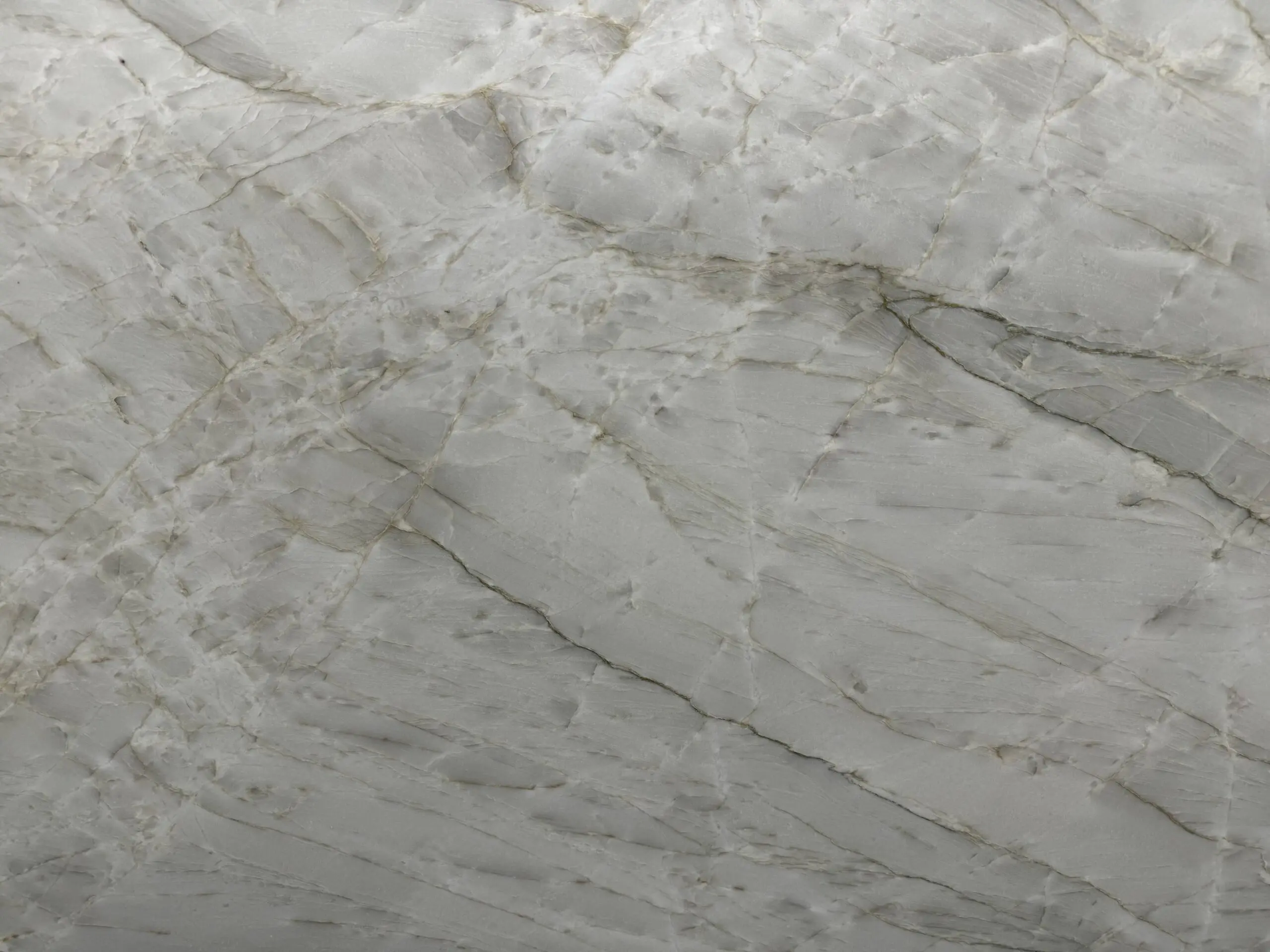The hidden secret in top-tier kitchens isn’t just the signature dishes or the culinary expertise of the chefs, but the lesser-known companion: soapstone countertops. Uncover why top chefs prefer kitchen soapstone countertops and how this subtle powerhouse transforms everyday cooking into a culinary art.
[ez-toc]

This article may interest you. COUNTERTOP MATERIALS: PROS AND CONS
Introduction to Soapstone: The Unsung Hero of Kitchens
In the midst of polished granite and quartz, soapstone emerges as a distinctive choice, loved by those who appreciate its unique features. Crafted by Mother Nature, this metamorphic rock possesses qualities that have been influencing kitchens since antiquity.
The Composition and Origin of Soapstone
Formed under intense heat and pressure, soapstone is primarily composed of the mineral talc along with traces of other minerals, lending it a unique softness and soapy feel. The incredible transformation that soapstone undergoes from its creation to its final installation in a kitchen is a tale worth exploring.
The History of Soapstone in Kitchen Use
Soapstone has a rich historical context, with its usage dating back to the early civilization periods. Ancient communities leveraged its unique properties for various applications, including cooking vessels and heating stones. This historical significance ties into the modern-day appeal of soapstone countertops in the culinary world.

Charcoal Soapstone Silestone
Why Top Chefs Prefer Kitchen Soapstone Countertops
Ever wondered why professionals in the culinary world are switching to soapstone countertops? Unravel the reasons behind this fascinating trend.
Heat Resistance and Thermal Properties
The extraordinary heat resistance of soapstone makes it a chef’s best friend. Its ability to withstand extreme temperatures without cracking or losing its integrity is commendable. Furthermore, its excellent thermal properties allow it to hold heat for longer, making it perfect for keeping dishes warm.
Durability and Longevity
If there’s one thing chefs value in a bustling kitchen, it’s durability. Soapstone countertops score high in this department, promising years of worry-free use. Despite being softer than granite or quartz, soapstone resists scratches and nicks remarkably well, contributing to its longevity.
Non-Porous Nature and Stain Resistance
Unlike many popular countertop materials, soapstone is non-porous, meaning it won’t absorb liquids. This gives it an advantage in terms of hygiene and stain resistance, as it doesn’t harbor bacteria or become discolored from spills.
Ease of Maintenance and Cleaning
With its non-porous nature, cleaning soapstone is as easy as pie. Wiping it down with a damp cloth is often all that’s needed to keep it looking pristine. This ease of maintenance is a major plus for busy chefs who prefer to focus on their culinary creations than on cleaning countertops.
Aesthetics and Natural Beauty
Last but not least, the natural beauty of soapstone is undeniably alluring. Its rich, dark hue, complemented by subtle veining, brings a touch of elegance and warmth to any kitchen. For chefs, this blend of functionality and aesthetics is hard to resist.
Soapstone vs Other Countertop Materials
Understanding why top chefs prefer kitchen soapstone countertops also involves exploring how it stacks up against other popular materials.
Soapstone vs Granite Countertops
While granite boasts a wide array of colors and patterns, it falls short when compared to soapstone’s heat resistance, non-porous nature, and ease of maintenance.
Soapstone vs Quartz Countertops
Quartz countertops may match soapstone’s non-porous attribute, but they lack its heat resistance and natural authenticity, making soapstone a superior choice for chefs.
Soapstone vs Marble Countertops
Marble, though beautiful, is prone to staining and scratching, making it less practical for a busy kitchen. In contrast, soapstone’s stain resistance and durability give it the upper hand.
Frequently Asked Questions
Why do chefs love the heat resistance of soapstone?
Chefs constantly deal with hot pots and pans. Soapstone’s heat resistance ensures the countertop won’t crack or discolor, even when subjected to high temperatures, which is a huge advantage in a busy kitchen.
Does soapstone require a lot of maintenance?
No, soapstone is incredibly low maintenance. All it requires is regular cleaning with a damp cloth and occasional oiling to keep its appearance at its best.
Is soapstone more expensive than other countertop materials?
The cost of soapstone is comparable to that of high-end granite or quartz countertops. Its durability and long-lasting nature, however, make it a cost-effective investment in the long run.
How do I clean a soapstone countertop?
Cleaning soapstone is simple. Just wipe it with a damp cloth and mild soap. Its non-porous nature ensures that it doesn’t harbor bacteria or absorb spills, making it hygienic and easy to clean.
Does soapstone scratch easily?
While soapstone is softer than granite, it’s still resilient and resistant to scratches and nicks. Minor scratches can be easily buffed out with sandpaper, contributing to its long-term appeal.
Does soapstone increase home value?
Absolutely. The unique, high-end look of a soapstone countertop, coupled with its many functional benefits, can increase the appeal and value of a home.
Conclusion
Now you know why top chefs prefer kitchen soapstone countertops. With its heat resistance, durability, non-porous nature, easy maintenance, and natural beauty, soapstone is a culinary maestro’s dream come true. Its performance and elegance elevate the kitchen experience, turning everyday cooking into a culinary adventure.


